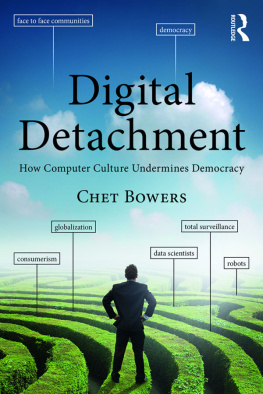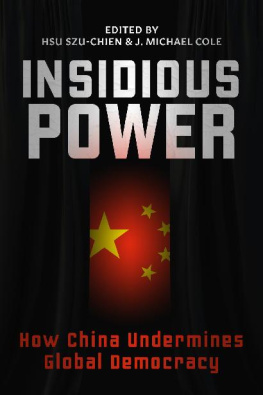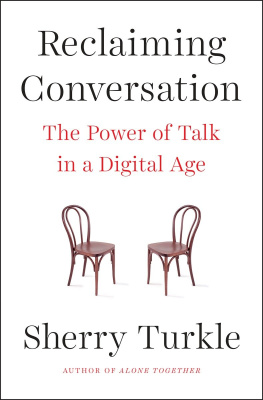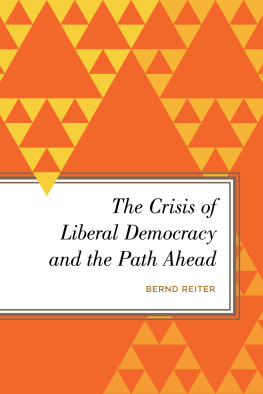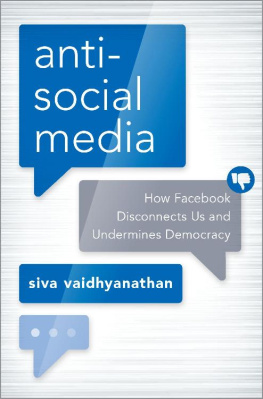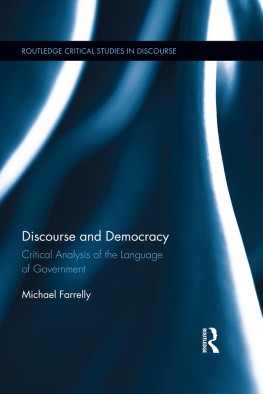Honestly, I am not sure if the importance of Chet Bowers new book on the Digital Revolution can be overestimated. I say this for two reasons. First, Chet Bowers is one of the very few original thinkers we have around; his approach and understanding is quite unlike what you can read elsewhere. Second, our infatuation with progress and in particular computer technology and the internet has totally blinded us against the threat this wholesale digital revolution is posing for our democracy and indeed our very survival. Chet Bowers is eloquently providing the much needed analysis to understand what is really going on.
Rolf Jucker, Director of SILVIVA, Swiss Foundation for Experiential Environmental Education, Switzerland
In the era of systems, beyond the era of tools, we are becoming merely subsystems, as Ivan Illich timely warned. This very pertinent book brings at a deeper level Chet Bowers critical analysis of the digital age and its real and symbolic impact on education and our daily lives. It is an urgent call for austerity in the use of tools like the internet, in order to protect personal relatedness, conviviality, local cultural contexts, and even Mother Earth. This is not another NeoLuddite manifesto but a pertinent call to reclaim common sense.
Gustavo Esteva, Activist, Oaxaca, Mexico
Few societies have demonstrated either much foresight or skill when confronted with new and potentially disruptive technologies. Who would have imagined for example, the impact of computers on commerce, manufacturing, finance, mail delivery, education, journalism, entertainment, surveillance, or simple patterns of human interaction, just thirty years ago? Chet Bowers has been attempting to direct our attention to the consequences of the digitalization of the world for much of this time. The issues he raises in this volume deserve widespread discussion as humanity attempts to learn how to live well and humanely with what may well be the most powerful tools ever invented by our species.
Gregory Smith, Lewis and Clark College, USA
Bowers has for decades been a brilliant writer on how the ecological crisis permeates education and our western society. In this important book on the digital revolution, he shows clearly what the internet still cannot do in terms of face to face democracy and the pivotal need to revitalize the worlds cultural commons. It helps us see what lacks in our ever more complicated world of digits and what is needed to lay the groundwork for reconnecting to the diversity of ecological, cultural, and moral lives that give sustenance to the meaning of glocal sustainability and solidarity.
Per Ingvar Haukeland, Director of Centre for Nature and Culture-Based Innovation, Telemark Research Institute, Norway
In contrast to such popular educational slogans as mobile learning and Internet democracy, this book not only provides a critical analysis of how the digital revolution is bypassing the democratic process, but also argues that the road to a sustainable future requires revitalizing traditions of wisdom and the cultural commons that are passed forward through face to face and mentoring relationships. This book challenges the current efforts to reduce human experience to what can be digitized and stored in the cloud.
Chun Ping Wang, Dean of Center for Teacher Education & Careers Service, National Taipei University of Education, Taiwan
DIGITAL DETACHMENT
The digital revolution is changing the world in ecologically unsustainable ways: (1) it increases the economic and political power of the elites controlling and interpreting the data; (2) it is based on the deep assumptions of market liberalism that do not recognize environmental limits; (3) it undermines face-to-face and context-specific forms of knowledge; (4) it undermines awareness of the metaphorical nature of language; (5) its promoters are driven by the myth of progress and thus ignore important cultural traditions of the cultural commons that are being lost; and (6) it both bypasses the democratic process and colonizes other cultures. This book provides an in-depth examination of these phenomena and connects them to questions of educational reform in the US and beyond.
Chet Bowers is a semi-retired university professor who has written 23 books that examine the linguistic/cultural roots of the ecological crisisand their implications for reforming universities and public schools. He has been an invited speaker at 40 foreign and 42 American universities.
DIGITAL DETACHMENT
How Computer Culture Undermines Democracy
Chet Bowers
First published 2016
by Routledge
711 Third Avenue, New York, NY 10017
and by Routledge
2 Park Square, Milton Park, Abingdon, Oxon OX14 4RN
Routledge is an imprint of the Taylor & Francis Group, an informa business
2016 Chet Bowers
The right of Chet Bowers to be identified as author of this work has been asserted by him in accordance with sections 77 and 78 of the Copyright, Designs and Patents Act 1988.
All rights reserved. No part of this book may be reprinted or reproduced or utilized in any form or by any electronic, mechanical, or other means, now known or hereafter invented, including photocopying and recording, or in any information storage or retrieval system, without permission in writing from the publishers.
Trademark notice: Product or corporate names may be trademarks or registered trademarks, and are used only for identification and explanation without intent to infringe.
British Library Cataloguing in Publication Data
A catalogue record for this book is available from the British Library
Library of Congress Cataloging in Publication Data
Names: Bowers, C. A., author.
Title: Digital detachment : how computer culture undermines democracy / Chet Bowers.
Description: New York, NY : Routledge, 2016. | Includes bibliographical references.
Identifiers: LCCN 2015034346| ISBN 9781138186842 (hardback) | ISBN 9781138186866 (pbk.) | ISBN 9781315643540 (e-book)
Subjects: LCSH: Democracy. | Information societyPolitical aspects. | InternetPolitical aspects. | Information technologyPolitical aspects.
Classification: LCC JC423 .B759 2016 | DDC 303.48/33dc23
LC record available at http://lccn.loc.gov/2015034346
ISBN: 978-1-138-18684-2 (hbk)
ISBN: 978-1-138-18686-6 (pbk)
ISBN: 978-1-315-64354-0 (ebk)
In memory of Douglas Tompkinsa force for nature and ecological intelligence
Chet Bowers is a semi-retired university professor who has written 23 books that examine the linguistic/cultural roots of the ecological crisisand their implications for reforming universities and public schools. He has been an invited speaker at 40 foreign and 42 American universities.
Joseph Progler has worked as a journalist on the Muslim world, and has been an invited speaker at schools, universities, and NGOs in Malaysia, Pakistan, Jordan, Palestine, and Turkey. He helped develop a degree program in International Studies at Zayed University in Dubai, and has lectured and taught courses in Iran, including at the University of Medical Sciences in Isfahan, Alzahrah University in Tehran, and the University of Religions and Denominations in Qom. The author of Books for Critical Consciousness and Encountering Islam, he currently teaches humanities at Ritsumeikan Asia Pacific University in Japan.
Azra Kianinejad has worked as an editor and researcher in Iran, at the Islamic Thought Foundation and Islamic Republic of Iran Broadcasting, has taught at Azad University in Tehran and the School of Islamic Arts in Qom, and has been an invited speaker at the Iranian Society for eLearning. The author of articles on education and society, she currently teaches comparative religions at Ritsumeikan Asia Pacific University in Japan.

